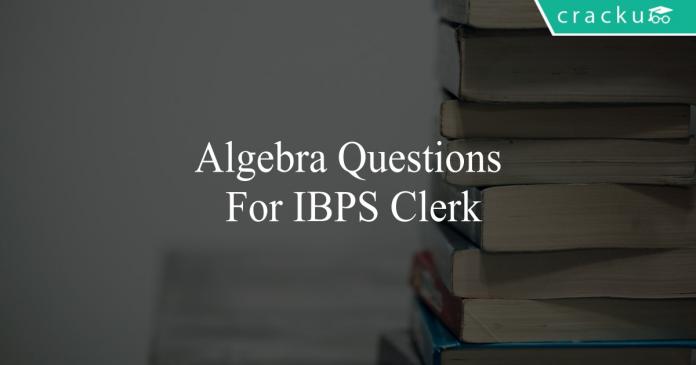Algebra Questions For IBPS Clerk
Download important Algebra Questions PDF based on previously asked questions in IBPS Clerk and other Banking Exams. Practice Algebra Question and Answers for IBPS Clerk Exam.
Download Algebra Questions For IBPS Clerk
Get 25 IBPS Clerk mocks for Rs. 149. Enroll here
Take Free IBPS Clerk Mock Test
Download IBPS Clerk Previous papers PDF
Go to Free Banking Study Material (15,000 Solved Questions)
Question 1: If $\frac{a}{b}=\frac{2}{3}$, then the value of $(5a^3-2a^2b):(3ab^2-b^3)$ is:
a) 16:27
b) 32:29
c) 34:19
d) 27:16
Question 2: If $x + x^{-1} = 2$, then the value of $x^3 + x^{-3}$ is:
a) 3
b) $\frac{1}{2}$
c) 1
d) 2
Question 3: If $(\frac{x}{a}) + (\frac{y}{b}) = 3$ and $(\frac{x}{b}) – (\frac{y}{a}) = 9$, then what is the value of $\frac{x}{y}$?
a) $\frac{( b + 3 a)}{( a – 3 b)}$
b) $\frac{( a + 3 b)}{( b – 3 a)}$
c) $\frac{(1 + 3 a)}{( a + 3 b)}$
d) $\frac{( a + 3 b^2)}{( b – 3 a^2)}$
Question 4: If $x + y = 3$, then what is the value of $x^3 + y^3 + 9xy$?
a) 15
b) 81
c) 27
d) 9
Question 5: If $x - 4y = 0$ and $x + 2y = 24$, then what is the value of $\frac{(2x + 3y)}{(2x – 3y)}$?
a) $\frac{9}{5}$
b) $\frac{11}{5}$
c) $\frac{13}{7}$
d) $\frac{9}{7}$
Question 6: If $(3^{33} + 3^{33} + 3^{33})(2^{33} + 2^{33}) = 6^x$, then what is the value of x?
a) 34
b) 35
c) 33
d) 33.5
Question 7: If $x_1x_2x_3 = 4(4 + x_1 + x_2 + x_3),$ then what is the value of $\left[\frac{1}{(2 + x_1)}\right] + \left[\frac{1}{(2 + x_2)}\right] + \left[\frac{1}{(2 + x_3)}\right]$?
a) 1
b) $\frac{1}{2}$
c) 2
d) $\frac{1}{3}$
Question 8: If $a^3 + 3a^2 + 9a = 1$, then what is the value of $a^3 + (\frac{3}{a})?$
a) 31
b) 26
c) 28
d) 24
Question 9: If $x + y + z = 0$, then what is the value of $\frac{(3y^2 + x^2 + z^2)}{(2y^2 – xz)}?$
a) 2
b) 1
c) $\frac{3}{2}$
d) $\frac{5}{3}$
Question 10: If $1^{2}+2^{2}+3^{2}+……..+p^{2}$ = $\frac{p(p+1)(2p+1)}{6}$, then $1^{2}+3^{2}+5^{2}+……..+17^{2}$ is equal to:
a) 1785
b) 1700
c) 980
d) 969
IBPS Clerk Important Questions PDF
Free Banking Study Material (15,000 Solved Questions)
Question 11: If $ x = \sqrt[3]{7}+3$ then the value of $x^{3}-9x^{2}+27x-34$ is:
a) 0
b) 1
c) 2
d) -1
Question 12: If 3√2 + √18 + √50 = 15.55, then what is the value of √32 + √72?
a) 13.22
b) 10.83
c) 14.13
d) 16.54
Question 13: If $7^{m+1}=2401$, then find the value of $2^{2m+2}$
a) 224
b) 256
c) 264
d) 286
Question 14: If a(x + y) = b(x – y) = 2ab, then the value of 2($x^{2} + y^{2}$) is
a) 2($a^{2} – b^{2}$)
b) 2($a^{2}+b^{2}$)
c) 4($a^{2} – b^{2}$)
d) 4($a^{2} + b^{2}$)
Question 15: If $( x – 5)^{2}$ + $(y – 2)^{2}$ + $(z – 9)^{2}$ = 0 , then value of (x + y – z) is
a) 16
b) -1
c) -2
d) 12
Daily Free Banking Online Tests
Answers & Solutions:
1) Answer (A)
Let a = 2 and b = 3
Then, $(5a^3-2a^2b):(3ab^2-b^3) = (5\times2^3 – 2\times2^2\times3) : (3\times2\times3^2 – 3^3)$
$= 5\times8 – 2\times4\times3 : 3\times2\times9 – 27$
$= 40-24 : 54-27 = 16 : 27$
2) Answer (D)
Given, $x+\dfrac{1}{x} = 2$
Cubing on both sides
$(x+\dfrac{1}{x})^3 = 2^3$
=> $x^3+\dfrac{1}{x^3}+3\times x\times \dfrac{1}{x}(x+\dfrac{1}{x}) = 8$
=> $x^3+\dfrac{1}{x^3}+3(2) = 8$
Therefore, $x^3+\dfrac{1}{x^3} = 8-6 = 2$
3) Answer (A)
$(\frac{x}{a}) + (\frac{y}{b}) = 3$
bx+ay=3ab
3bx+3ay=9ab
$(\frac{x}{b}) – (\frac{y}{a}) = 9$
ax-by=9ab
3bx+3ay=ax-by
3bx-ax=-by-3ay
x(3b-a)=y(-b-3a)
y/x =(a-3b)/(3a+b)
x/y=(3a+b)(a-3b)
4) Answer (C)
x+y=3
Cubing on both sides
$x^{3}+3xy(x+y)+y^{3}$=27
$x^{3}+3xy(3)+y^{3}$=27
$x^{3}+9xy+y^{3}$=27
5) Answer (B)
Given x-4y=0
x=4y
x+2y=24
6y=24
y=4
x=16
$\frac{(2x + 3y)}{(2x – 3y)}$=$\frac{(2*(16) + 3*(4))}{(2*(16) – 3*(4))}$
=44/20
=11/5
6) Answer (A)
$(3^{33} + 3^{33} + 3^{33})(2^{33} + 2^{33}) = 6^x$
$(3*3^{33})(2*2^{33}) = 6^x$
$(3^{34})(2^{34})=6^x$
$6^{34}=6^x$
x=34
7) Answer (B)
$x_1x_2x_3 = 4(4 + x_1 + x_2 + x_3),$
From clear observation we can say that $x_1=4,x_2=4,x_3=4 $ will satisfy the equation
i.e 4*4*4=4(4+12)
64=64
Therefore $\left[\frac{1}{(2 + x_1)}\right] + \left[\frac{1}{(2 + x_2)}\right] + \left[\frac{1}{(2 + x_3)}\right]$=3(1/6)
=1/2
8) Answer (C)
$a^3 + 3a^2 + 9a = 1$
$a(a^2 + 3a + 9)=1$
$a^2 + 3a + 9=1/a$
$(a^3-b^3)$=$(a-b)(a^2+ab+b^2)$
for b=3
we have $(a^3-3^3)$=$(a-3)(a^2+3a+9)$
$(a^3-27)$=$(a-3)(1/a)$
$a^3+(3/a)=1+27$
$a^3+(3/a)=28$
9) Answer (A)
Solution 1:
As the answer is independent of variables and so we can assume values for x,y and z an solve
let x=1,y=-1,z=0 therefore x+y+z=1-1+0=0
$\frac{(3y^2 + x^2 + z^2)}{(2y^2 – xz)}$
=$\frac{(3(-1)^2 + 1^2 + 0^2)}{(2(-1)^2 – 1*(0))}$
=$\frac{4}{2}$
=2
Solution 2:$\frac{(3y^2 + x^2 + z^2)}{(2y^2 – xz)}$=k
$(3y^2 + x^2 + z^2)$=$k(2y^2 – xz)$
$x^2 + z^2+kxz$=$2ky^2-3y^2$
We know x+y+z=0
we can see that for k=2
we get $(x+z)^{2}=y^{2}$
x+z+y=0
Therefore value of k=2
10) Answer (D)
Expression : $1^{2}+3^{2}+5^{2}+……..+17^{2}$
= $[1^{2}+2^{2}+3^{2}+4^{2}……..+16^{2}+17^{2}]$ $-[2^2+4^2+………+16^2]$
= $[1^{2}+2^{2}+3^{2}+4^{2}……..+16^{2}+17^{2}]$ $-(2^2)[1^2+2^2+3^2………+8^2]$
= $[\frac{17(17+1)+(34+1)}{6}]-[4\times\frac{8(8+1)(16+1)}{6}]$
= $[\frac{17(17+1)+(34+1)}{6}]-[4\times\frac{8(8+1)(16+1)}{6}]$
= $[51\times35]-[48\times17]$
= $17\times(105-48)=969$
=> Ans – (D)
11) Answer (A)
Given : $ x = \sqrt[3]{7}+3$
=> $x-3=\sqrt[3]7$
Cubing both sides, we get :
=> $(x-3)^3=(\sqrt[3]7)^3$
=> $x^3-27-3(3x)(x-3)=7$
=> $x^3-27-9x^2+27x-7=0$
=> $x^{3}-9x^{2}+27x-34=0$
=> Ans – (A)
12) Answer (C)
Given : $3\sqrt2+\sqrt{18}+\sqrt{50}=15.55$
=> $3\sqrt2+3\sqrt2+5\sqrt2=15.55$
=> $\sqrt2=\frac{15.55}{11}=1.413$ ———–(i)
To find : $\sqrt{32}+\sqrt{72}$
= $4\sqrt2+6\sqrt2=10\sqrt2$
= $10\times1.413=14.13$
=> Ans – (C)
13) Answer (B)
Given : $7^{m+1}=2401$
=> $7^{m+1}=7^4$
=> $m+1=4$
=> $m=4-1=3$
$\therefore$ $2^{2m+2}=2^{2\times3+2}$
= $2^8=256$
=> Ans – (B)
14) Answer (D)
Given : a(x + y) = b(x – y) = 2ab
=> $a(x+y)=2ab$
=> $(x+y)=2b$
Squaring both sides,
=> $(x+y)^=(2b)^2$
=> $x^2+y^2+2xy=4b^2$ ———–(i)
Similarly, $(x-y)=2a$
Squaring both sides,
=> $(x-y)^=(2a)^2$
=> $x^2+y^2-2xy=4a^2$ ———–(i)
Adding equations (i) and (ii), we get :
=> $2x^2+2y^2=4a^2+4b^2$
=> $2(x^2+y^2)=4(a^2+b^2)$
=> Ans – (D)
15) Answer (C)
Expression : $( x – 5)^{2}$ + $(y – 2)^{2}$ + $(z – 9)^{2}$ = 0
$\because$ If sum of three positive numbers is zero, then the numbers are equal to zero
=> $(x-5)^2=0$
=> $(x-5)=0$
=> $x=5$
Similarly, $y=2$ and $z=9$
To find : $(x+y-z)$
= $5+2-9=-2$
=> Ans – (C)
Highly Rated Free Preparation App for Banking Exams
We hope this Algebra questions and answers for IBPS Clerk preparation will be helpful to you.





